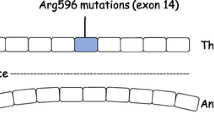Abstract
Resistance to activated protein C (RAPC) is a newly recognized hypercoagulable state that was first described in 1993. It has become apparent that RAPC is even more common than deficiencies in protein C, protein S, or antithrombin III (AT-III) and affects an estimated 5% of the general population. The majority of patients with RAPC have an abnormality in factor V (Arg506Gln), which renders factor Va resistant to degradation by activated protein C. Studies in 75 patients referred to the Hematology Laboratory at Walter Reed Army Institute of Research (WRAIR) over a 14-month period for evaluation of venous thromboembolism were reviewed to determine the percentage of those with RAPC. Of the 75 patients in the study, one was deficient in protein S, one was deficient in protein C, and none was deficient in AT-III. In contrast, 27 (36%) patients tested positive for RAPC. Blood was available for DNA analysis in 15 patients with RAPC. Of these 15 patients, nine (60%) tested positive for the Arg506Gln mutation in factor V. Six other patients with RAPC did not have the factor V mutation. Additional risk factors for thrombosis were immobility, obesity, use of oral contraceptives, and pregnancy. The majority of patients had deep venous thrombosis of the lower extremities; 71% had a recurrence if not placed on chronic anticoagulation therapy. Thus RAPC is a significant risk factor for venous thrombosis. Evaluation for inherited hypercoagulable states should include testing for this newly described condition.
Similar content being viewed by others
References
Dahlback B, Carlsson M, Svensson PJ. Familial thrombophilia due to a previously unrecognized mechanism characterized by poor anticoagulant response to activated protein C. Proc Natl Acad Sci USA 1993;90:1004–1008.
Greengard JS, Eichinger S, Griffin JH, et al. Brief report: Variability of thrombosis among homozygous siblings with resistance to activated protein C due to an Arg→Gln mutation in the gene for factor V. N Engl J Med 1994;331:1559–1562.
Bertina RM, Koeleman BPC, Koster T, et al. Mutation in blood coagulation factor V associated with resistance to activated protein C. Nature 1994;369:64–67.
Greengard JS, Sun X, Xu X, et al. Activated protein C resistance caused by Arg506Gln mutation in factor Va. Lancet 1994;343:1361–1362.
Zöller B, Dahlback B. Linkage between inherited resistance to activated protein C and factor V gene mutation in venous thrombosis. Lancet 1994;343:1536–1537.
Koster T, Rosendaal FR, de Ronde H, et al. Venous thrombosis due to poor anticoagulant response to activated protein C: Leiden Thrombophilia Study. Lancet 1993;342:1503–1506.
Dahlback B. Inherited thrombophilia: Resistance to activated protein C as a pathogenic factor of venous thromboembolism. Blood 1995;85:607–614.
Ridker PM, Hennekens CH, Lindpainter K, et al. Mutation in the gene coding for coagulation factor V and the risk of myocardial infarction, stroke, and venous thrombosis in apparently healthy men. N Engl J Med 1995;332:912–917.
Bolan CD, Krishnamurti C, Tang DB, et al. Association of protein S deficiency with thrombosis in a kindred with increased levels of plasminogen activator inhibitor-1. Ann Intern Med 1993;119:779–785.
Vandenbroucke JP, Koster T, Briët E, et al. Increased risk of venous thrombosis in oral-contraceptive users who are carriers of factor V Leiden mutation. Lancet 1994;344:1453–1457.
Rosendaal FR, Koster T, Vandenbroucke JP, et al. High risk of thrombosis in patients homozygous for factor V Leiden (activated protein C resistance). Blood 1995;85:1504–1508.
Author information
Authors and Affiliations
Additional information
Supported in part by NIH grant R37-HL52246.
The opinions contained herein do not necessarily reflect the opinions of the U.S. Department of the Army or Department of Defense.
About this article
Cite this article
Gillespie, D.L., Carrington, L.R., Griffin, J.H. et al. Resistance to activated protein C: A common inherited cause of venous thrombosis. Annals of Vascular Surgery 10, 174–177 (1996). https://doi.org/10.1007/BF02000762
Issue Date:
DOI: https://doi.org/10.1007/BF02000762




